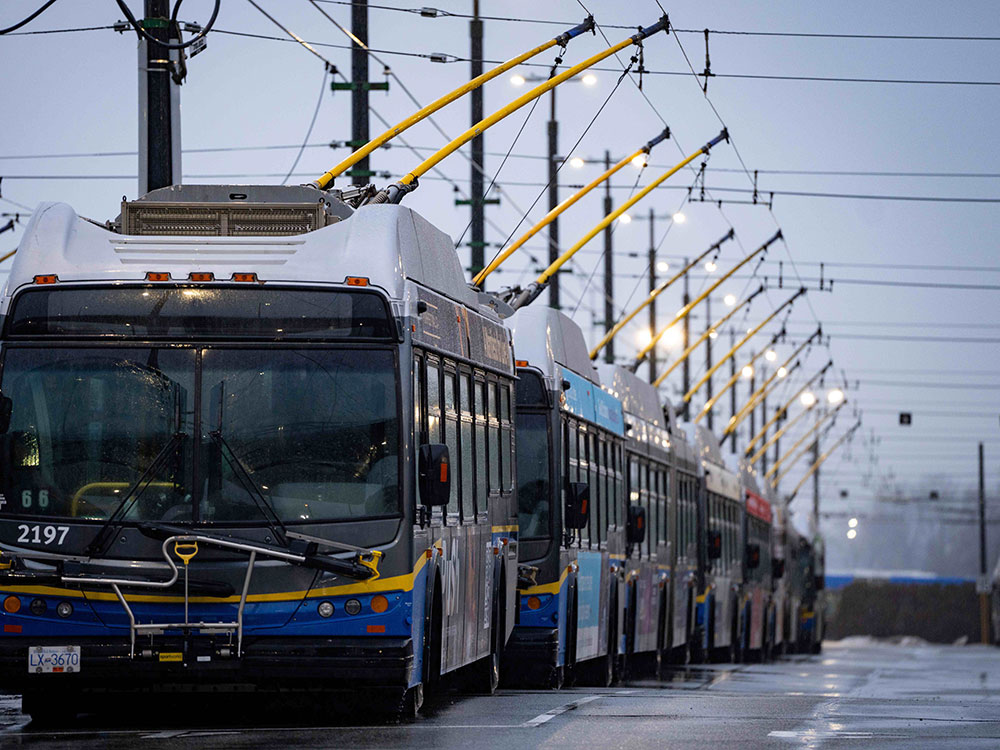It’s a dark night, and six workers are on a picket line that helped freeze Metro Vancouver’s bus system.
A few sit quietly under tarps, taking shelter from the drizzle. Another rips long strips of cardboard and feeds them into a fire in a large metal barrel, a piece of wood protruding from its top. Inside the Vancouver Transit Centre, on the other side of a chain-link fence near the Fraser River, dozens of buses sit idle.
The workers, who wouldn’t speak to The Tyee, were among the 180 members of Canadian Union of Public Employees Local 4500 and supporters on a two-day strike that paralyzed much of the public transportation system.
Weeks of failed negotiations culminated in the stoppage earlier this week that shut down most bus and SeaBus services in Metro Vancouver and left hundreds of thousands of commuters without a ride.
The clock is ticking on the next strike. The province has dispatched Vince Ready, a veteran labour negotiator, to try to broker a deal between the two parties. If that fails, CUPE national representative Liam O’Neill said, the union would launch a three-day strike starting on Feb. 3.
“We’re committed to working with the special mediator. We hope his recommendations might show us a path to a fair collective agreement,” O’Neill said in a press release Wednesday. “If not, CUPE 4500 members will be left with no choice but to take the next step.”
If the union has its way, O’Neill said, that strike could also shut down SkyTrain and operations at other TransLink buildings. The BC Labour Relations Board hasn’t yet ruled on the union’s requests to picket those locations.
Coast Mountain Bus Co., the employer, said it welcomed Ready’s appointment and declined further comment.
Labour Minister Harry Bains expressed faith in Ready, often tapped by government to resolve acrimonious disputes. Bains recently described Ready, 81, as a “miracle worker.”
Ready was appointed Thursday. He’ll have six days to make recommendations to the parties, who will have five days to decide whether to implement them.
Ready, who has already worked as a mediator with Coast Mountain and CUPE 4500, faces a tall task. The union and company have accused each other of intransigence and deception.
Coast Mountain and TransLink have told media that the union’s wage demands for transit supervisors are way out of step with industry standards and could create huge costs across the region by triggering “me-too” clauses in collective agreements with other unions, which would compel the company to give raises to other workers too.
The union says it is seeking fair pay for complex jobs and relief for desperately overworked transit supervisors. CUPE 4500 has also alleged that Coast Mountain violated provincial labour laws by illegally having managers perform the work of striking union members during its initial overtime ban.
Caught in the middle are roughly 5,000 transit workers who are not on strike but are expected not to cross picket lines, and hundreds of thousands of commuters scared of the possibility the buses will stop yet again.
Picketing power
There are about 180 members of CUPE 4500 working at Coast Mountain Bus Co.
But small picket lines like the one outside the Vancouver Transit Centre can shut down the system.
British Columbia’s labour laws mean union members can lawfully refuse to cross picket lines without losing their jobs, even if they are not on strike.
That meant thousands of bus drivers, administrative staff and other unionized employees didn’t show up for work on Monday or Tuesday after picket lines went up.
That created plenty of chaos. “It was hectic. People didn’t know whether there was a strike on or not,” Kulwant Sahota said. Sahota, president of Yellow Cab, spent the morning ferrying standing commuters around. Some, he said, had turned to ride-hailing apps, only to find the prices were triple the usual rate. Others carpooled in taxis to save cash.
The work stoppage, which came after a failed weekend of bargaining that stretched into the early hours Monday, drew criticism from Coast Mountain.
“This strike has too much impact on our customers that count on us,” said TransLink CEO Kevin Quinn at a Monday press conference. Mike Killeen, a Coast Mountain spokesman, called it “disappointing and unfortunate.”
CUPE 4500 wants its next work stoppage, scheduled for three days, to hit even harder.
It wants to get permission to picket more locations and create more disruption, with a goal of pushing Coast Mountain to accede to its requests.
SkyTrain workers are not on strike. They work for a different employer, British Columbia Rapid Transit Co.
But CUPE 4500 is at the BC Labour Relations Board next week to argue that British Columbia Rapid Transit Co. is helping Coast Mountain by providing a travel alternative on SkyTrain, blunting the impact of their strike.
Under the province’s labour law, companies that help an employer can be declared “allies,” which gives the union the legal right to picket those companies, too. If CUPE 4500 were to do that, it would shut down SkyTrain services, since those union workers would refuse to cross.
Susanna Quail, a lawyer whose firm is representing CUPE 4500 in its applications to the board, told The Tyee the union is also applying to picket TransLink’s offices under the same law in a Friday hearing.
The union plans to argue that TransLink’s comments to the media show it has acted as an ally to Coast Mountain and as a result its offices are fair game for picketing.
Mark Thompson, a former arbitrator and emeritus professor at the University of British Columbia’s Sauder School of Business, said in a previous interview with The Tyee that he believes the union is trying to “tighten the thumbscrews” on the employer.
But Thompson noted there are risks to the union’s strategy. One is that it could sour public opinion. Another is that it could alienate the thousands of other union workers who will miss shifts, and thus wages, because of the repeated work stoppages.
Publicly, those unions have been resolute in their support for CUPE 4500. On Tuesday members of Unifor Local 111, which represents bus drivers, held a press conference blaming Coast Mountain for the strike and demanded the company pay for wages lost during the two-day stoppage.
Gavin McGarrigle, Unifor’s western regional director, said his members respected picket lines and “would not be used as pawns” by the employer.
But he said no one was happy to lose the money.
Unifor members “understand picket lines, they understand the impact, but nobody likes to lose two days of wages, especially in January, and especially when it’s not your own strike,” McGarrigle said.
Buses abandoned in the snow
CUPE 4500’s strike didn’t begin with the work stoppage this week.
Since Jan. 6, transit supervisors, communications workers and other staff represented by the union have been refusing to work overtime.
A hearing at the BC Labour Relations Board this week suggests the overtime ban had a major impact on transit services and led to more tension between the parties.
CUPE 4500 has accused Coast Mountain of trying to circumvent the overtime ban by having certain managers do work reserved for transit supervisors, something the union says would violate the province’s laws against replacement workers.
Coast Mountain’s lawyer, Sari Wiens, said in her opening statement that the employer denies any breach of the labour code.
“It is contentious times, difficult times for everyone during the labour dispute,” Wiens said.
Transit supervisors work a considerable amount of overtime, Quail said, which has been a key issue at the bargaining table.
That was especially true on Jan. 11 and Jan. 12, when snowstorms battered Metro Vancouver. Gagan Gill, a transit supervisor, testified at the board that he saw numerous buses stranded on frozen roads, some of which hadn’t even been reported.
Gill and fellow transit supervisor Jakub Rakowski testified that in previous snowstorms they worked considerable overtime to recover stranded buses. Rakowski said he worked a 14-hour shift after a snowstorm last year.
But this year, overtime wasn’t an option. Quail alleges that some Coast Mountain managers ended up stepping in to do the work, something the union says unfairly blunted the effect of the overtime ban.
“Even after a snowstorm, this is absolutely not something that would be part of the responsibility of an operations supervisor outside the bargaining unit,” Quail said.
— With files from Katie Hyslop ![]()
Read more: Transportation, Labour + Industry

















Tyee Commenting Guidelines
Comments that violate guidelines risk being deleted, and violations may result in a temporary or permanent user ban. Maintain the spirit of good conversation to stay in the discussion and be patient with moderators. Comments are reviewed regularly but not in real time.
Do:
Do not: